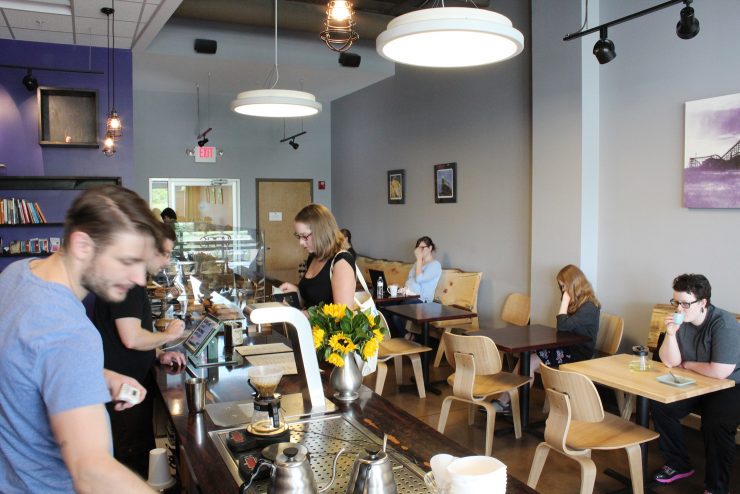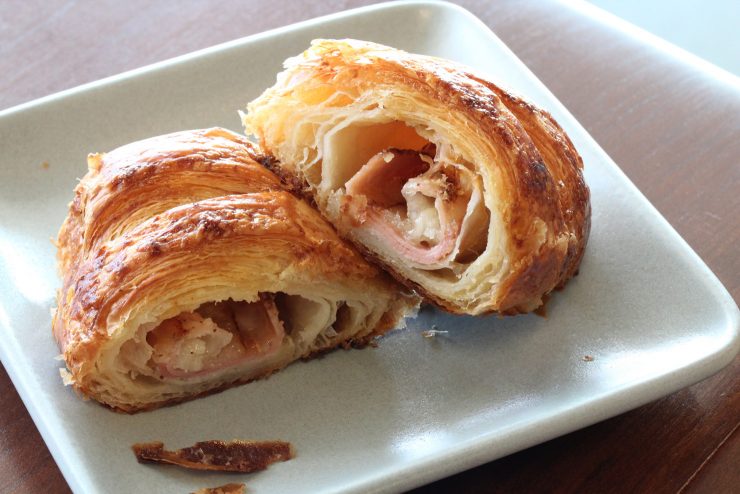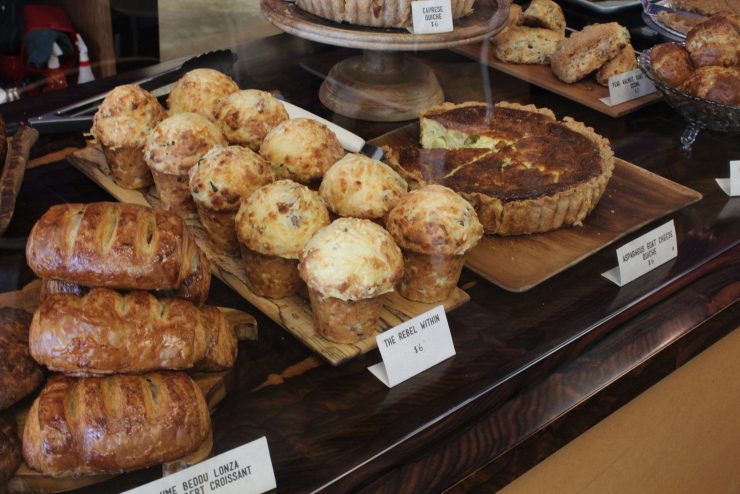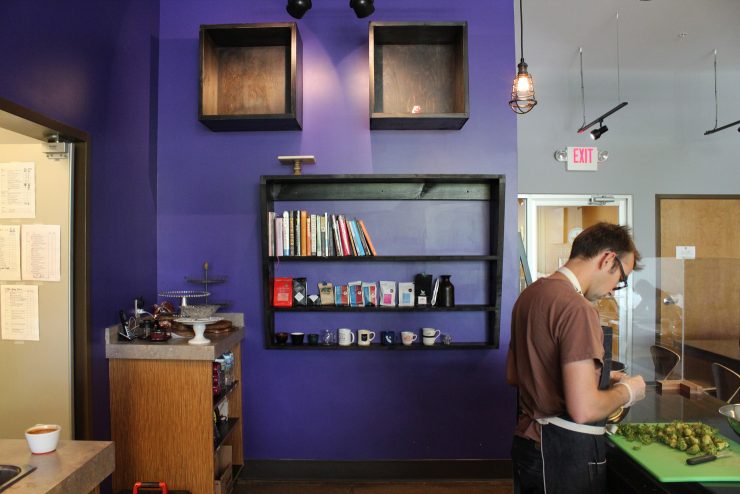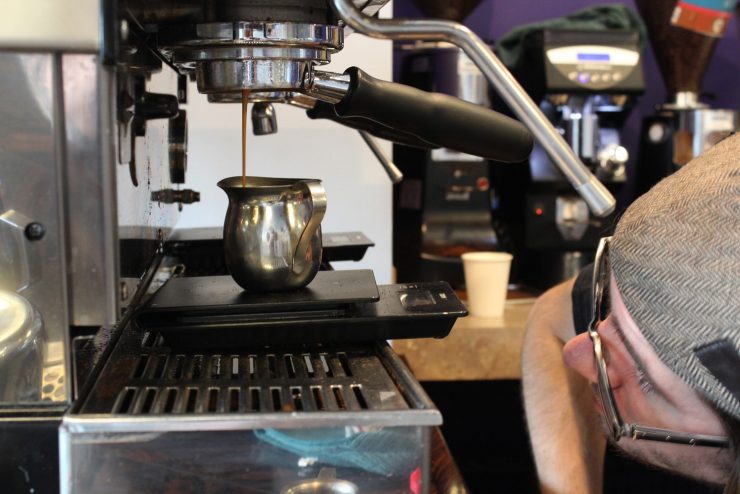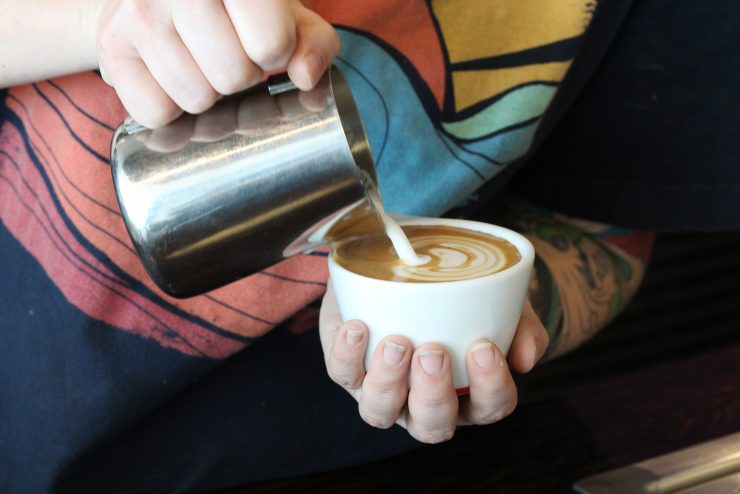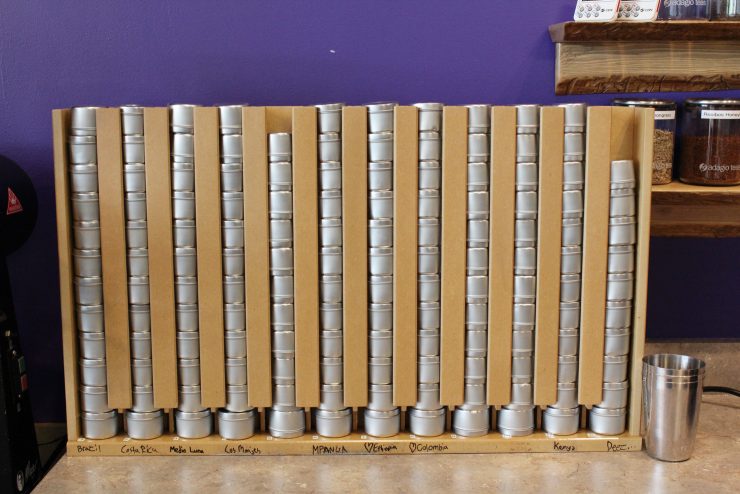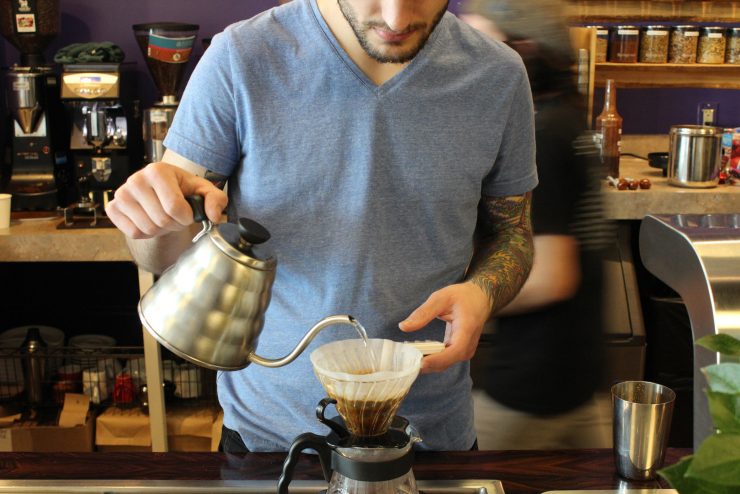There are five minutes before Comet Coffee opens on a mild May Friday morning, and there are already people queueing up to come inside. Inside, the lights stay dimmed, as espresso parameters are confirmed on the La Marzocco Linea PB. A platoon of pre-portioned coffee tins stands at attention on the back counter next to a Mahlkönig EK 43 and a trio of espresso grinders. It’s necessary: the robust pour-over coffee menu regularly boasts at least eight selections.
Sitting opposite of the slow bar and occupying prime real estate next to the register is the pastry case. Bakers have been working in Comet’s minuscule 150-square-foot kitchen since 5 a.m. to stock these shelves. Before being placed behind glass for public display, each pastry is curated like an art exhibit in the back. Now, the case is brimming with 18 distinct scratch-made and freshly baked treats, ranging from sweet to savory and spicy. Think classics like chocolate chip cookies, blueberry muffins, and croissants, joined by savory pastries made with charcuterie from local purveyors Salume Beddu.
When the door unlocks to begin the day, a cyclist clad in a neon jersey rolls over to the case to select a pastry accompaniment for his cappuccino. Soon, a steady stream of guests flow through the space. The pastry supply dwindles as the hours tick away, leaving one crumb-filled tray after another.
Situated under corporate business offices across from St. Louis’ Forest Park, Comet Coffee has an unassuming presence. The multi-roaster coffee shop and microbakery is helmed by Mark Attwood and Stephanie Fischer; they are partners in both business and life. The duo originally “mused” about opening a shop together when Fischer would bring in pastries from culinary school to Attwood’s coffee job at a Kaldi’s Coffee kiosk inside a suburban grocery store.
“I worked a really late shift, so I spent the time learning about coffee,” he says. “There were maybe two or three people that I would give coffee between 9 and 10PM . . . and I would just pretty much mess around with espresso.”
Humble grocery kiosk beginnings aside, the coffee bug bit Attwood full-force after receiving pointers from former Kaldi’s head trainer and current Cafe Imports Director of Education Joe Marrocco. He continued late-night practice sessions, read coffee books, and attended an early edition of Camp Pull-A-Shot to expand his knowledge. When he left the coffee kiosk, Attwood sought a barista position and applied to stand-alone cafes around the area. No one offered a job. So he decided to open a coffee shop.
“Honestly, I knew how much work it would take to start a shop, because I had gone to all these events and talked to a lot of people who had opened shops—and it was not what I wanted to do,” Attwood says. His practicality on the business side of things is informed by an economics degree: “I would have much rather been working in coffee as like, a manager, than as a business owner because of all the stuff you have to do, besides the coffee. But, that’s the route I had to go.”
To save money, Attwood and Fischer sought out going-out-of-business sales as a way to get cheap equipment. That’s how they found Sabu’s Coffee, which had just closed. As they were looking at their coffee equipment, the owner suggested they should just sublease the whole space. In one fell swoop, the blueprint for Comet fell into place.
Comet Coffee officially opened in August 2012, which is eons ago in the specialty coffee time scale, but especially in a city like St. Louis. Attwood’s sales projections were based off his old job numbers, but his new business’ sales didn’t reflect the balance sheets. Slowly over the first and second year, people from across the city got turned on to Attwood & Fischer’s tucked away little coffee shop with unexpectedly great pastries. Word of mouth and buzz, especially among the city’s coffee professionals, helped grow an ardent base of regulars. Today the shop is firmly on this city’s culinary map, with Comet Coffee being named to St. Louis Post-Dispatch restaurant critic Ian Froeb’s inaugural Top 100 Restaurant list for 2015.
The coffee menu at Comet is always in flux; multi-roaster cafes are nothing new, but Comet Coffee offers one of America’s most prolific and playful examples of the form. On a recent visit, I counted eleven individual pour-over options. As a brown coffee buyer, Attwood gravitates towards roasting companies with efficient supply chains from farm to roaster to his shop. His aim is to have some of the first coffee crops in each region showcased at Comet Coffee, and to display as many as possible throughout the year for as long as possible. Roaster mainstays at the shop include Denver’s Sweet Bloom Coffee (their Hometown espresso is the shop’s house espresso), Seattle’s Kuma Coffee, Portland’s Heart Coffee Roasters, and London’s Square Mile Coffee Roasters, as well as local roaster Blueprint Coffee.
“I know a lot about coffee, but I don’t think I’m going to roast coffee better than any of these other top roasters,” Attwood says. “I would try their coffee and be like, ‘You know what, I’m probably not going to be able to beat this. And I’m probably not going to be able to establish the supply-chain that these roasters have already.’ I can do 300 different coffees here, but if I roasted, I could maybe do 20–30 coffees here.”
Expansion plans are on the horizon for Comet Coffee, specifically a separate facility for production baking and R&D. Due to the tight quarters, the shop hand rolls out their croissant dough twice a week. They have to keep the kitchen’s only oven off to achieve that dough’s ideal temperature, then devote the main kitchen counter to rolling it out. The process takes hours to complete, and it’s pretty tiring. That’s why a larger space and a dough feeder are at the top of Comet’s wish list.
But for now, the hidden gem keeps shining. A new set of dual pine wood benches (14.5- and 18.5-feet, respectively) pitch back to offer a relaxing oasis of pastries and coffee.
“You can buy a cup of the best coffee in the world for probably around $12,” Attwood tells me, before expanding on the concept. “12 bucks seems like a lot for a cup of coffee, but when you’re talking about the best of something in the world, 12 bucks is pretty much something anyone can afford. I felt like coffee was just one of those things where, you could do it really well at a pretty affordable rate. And it’s really something anyone can be kind of geeky about, and not be breaking their wallet to enjoy it. And also, it gives you focus, it has antioxidants, helps fight cancer—has all these health benefits—fights Type II Diabetes, fights dementia, Alzheimer’s. So not only is it complex and interesting—it’s super good for you. How much stuff can you say is like that?”
Comet Coffee is located at 5708 Oakland Avenue, St. Louis, Missouri.
Evan C. Jones (@theevanjones) is a Sprudge.com contributor based in St. Louis. Read more Evan C. Jones on Sprudge.
The post Comet Coffee St. Louis: Bakery, Multiroaster Cafe, Place Of Wonder appeared first on Sprudge.


